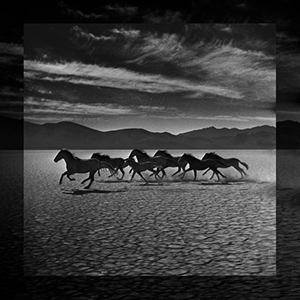Oikos, "The Great Upheaval"
 For their first vinyl release, Rafael Femiano (guitars and electronics) and Felipe Pavon (drums and percussion) pulled out all of the stops on the most recent Oikos release. In this case, that metaphor may be a bit of a misnomer, since most of The Great Upheaval is much more about mood and ambience than full bore explosions of sound, although those feature here as well. The tasteful balance of the two, and the impeccable compositional structures, results in an album that is gripping in its intentional bleakness.
For their first vinyl release, Rafael Femiano (guitars and electronics) and Felipe Pavon (drums and percussion) pulled out all of the stops on the most recent Oikos release. In this case, that metaphor may be a bit of a misnomer, since most of The Great Upheaval is much more about mood and ambience than full bore explosions of sound, although those feature here as well. The tasteful balance of the two, and the impeccable compositional structures, results in an album that is gripping in its intentional bleakness.
Knockturne/Envelope Collective
Admittedly, it is hard to listen to the opening moments of "Ravaged, Burned" without being reminded of Earth’s 21st century output.Oikos does a similarly excellent job at capturing that desolate Western expanse, like a Morricone soundtrack stripped to its barest essentials.However, it is really only the one part of atmosphere where the two seem similar.Oikos instead works more in change and variation, adding more dissonant and varied sounds to the mix in comparison, creating an effect akin to a camera shot widening to show the windswept dustbowl is not in the past, but a post-apocalyptic wasteland in the near future.
As the aforementioned "Ravaged, Burned" slowly expands with cymbal washes and clean guitar tones, the transition into the slow burning darkness of "Menace and Portent" (with David Cordero on additional guitar and synthesizer and Raul Perez on bass) strengthens both pieces.The previously clean tones take on more of a dissonant, vibrating quality, with an underlying sense of menace growing by the minute.The piece finally erupts with a satisfying distorted guitar chug and heavy, pounding drums that beautifully contrast the uneasy peace that preceded it.  The somewhat brief interlude "Joik" makes for a nice transition.The resonating and echoing guitar is blended with an all too brief passage of snappy rhythm (by High Aura’d’s John Kolodij), hinting at a more noise rock sound that never comes.Instead, the rhythms just as quickly fade out, a fleeting bit of uptempo sounds that instead fall back to the ambient desolation that is its own unique form of beautiful, with additional voices by Maria Gil.
This blends nicely into the other side's 10 minute "Marrow of Prayer," at first a lush sea of guitar tone that nicely expands with time.Even with its slightly sinister mood, there is a pleasant and beautiful sound to it.As the piece goes on, the light begins to fade and the mood turns bleaker, with the band adding in more dissonant layers of guitar (with additional contributions by Juan G. Acosta).What at first sounds like simple guitar drone reveals itself to be something much more complex; a contrast that becomes the piece’s strongest facet.The transition into the concluding "Arch" has Oikos continuing the same mood and space, but the subtle addition of drums is an exceptional touch.The rhythms are slid in carefully, and never do they upset the mood generated by the guitars.Finally, after the swell of bowed contrabass sounds (by Marco Serrato), the album ends on a weird dying motor type noise, a fitting conclusion for a sound that is so balanced between natural and man-made destruction and decay.
One of the greatest assets of The Great Upheaval is its mood and variation.Femiano, Pavon, and the guest artists do an amazing job at capturing the bleak emptiness of a wasteland and the decay surrounding it.But there is more to here than just mood, of course.Memorable melodies and rhythms appear all throughout, making for a strong musical counterpoint to the imaginary landscapes Oikos creates via their sound.The palpable desolation just makes for an additional layer to an already exceptional album.
samples:
 



